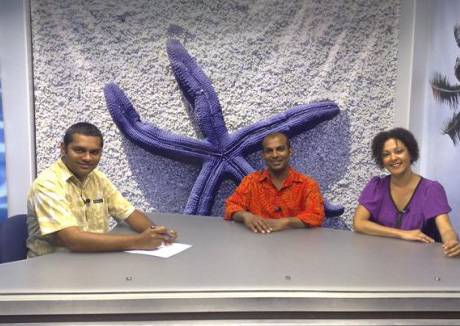
What I provide to you today is observations and an overview of some of the ethical and media freedom issues being faced by journalists in Fiji today given my experiences as the news director of the Fiji Broadcasting Corporation.
I took on the position of news director at the FBC just over eight months ago in December 2009 – also just eight months after the imposition of public emergency regulations and media censorship that came into place in April 2009 - after the abrogation of the 1997 Constitution.
The Fiji media landscape (as many of you know) has changed dramatically over the last three to four years, and especially over the last year with the enactment of the Media Decree 2010 outlining new and stronger guidelines for the media to abide by.
We are all operating now under this media decree, while the censorship still remains for now.
One of the major ethical issues that has confronted our journalists over the last year or so is how do we report and practise the principles of journalism under a censored environment?
Particularly the principles of being fair and balanced when reporting a story – and verifying the accuracy of a story.
Over the last 18 months, most, if not all, of the opponents of the current government are not allowed to be heard on air – as well as reports that are deemed by the Ministry of Information to be inaccurate, misleading or have the potential to cause instability or disorder.
Political development
The Fiji government has clearly indicated that it has a plan for the economic and political development of the country up to 2014 – and has decided that it is important that nothing gets in the way of achieving and implementing this plan.
Media reports therefore are being monitored and censored to help facilitate this ‘Roadmap.’ That is the law as it stands today.
The question that many newsrooms in Fiji have grappled with in response to the current situation is whether we should practise self-censorship. Different media organisations have taken different decisions and stands on this. It seems that whatever position one takes in this situation – there will be accusations from certain quarters of unethical behaviour.
There have been many academic and philosophical guidelines thrown at us to look at and consider (on what is the right and wrong thing to do in this situation) – but there is also the other thing called reality.
In Fiji we are dealing with the reality . That is why – while I may not agree with the decisions being made by some media organisations in Fiji, I will never criticise their decision.
Everyone is responding to the difficult reality before them at this time – and have made the decisions they see fit after considering all the options.
People from outside can criticize the decision or stance each media organization has taken – but ultimately it is us who will live with this decision, and will be taken to account in due time by our viewers, readers and audience. Five years from now we may see and accept that we either made the right or wrong decisions – but right now we are dealing with the reality we are being faced with.
Ethical dilemma
Another dilemma being faced is merging what you think or believe is right – and what role you need to play as a journalist or media organisation. Everyone in Fiji has their personal view on whether the current government in Fiji was right or wrong to do what they did in 2006 and now. This provides an ethical dilemma for many journalists in Fiji.
What media ethics or media principles should we apply?
Should they run a campaign against a government they think is illegal and not acknowledge them as PM or Attorney General – or should they basically provide both sides of the story (regardless of what they think of the legality) and let the public decide for themselves who they think is right.
Should journalists and media organisations hold the high moral ground and inject their personal or collective view, opinion or belief in their reports or in choosing who to cover and what stories to cover – as well as how people are being addressed?
Different media organisations have taken different positions on this.
An example is whether Bainimarama should be called the Prime Minister of Fiji. Media in Fiji have differed on this, with some refusing to call him PM.
The Media Industry Development Decree 2010 was enacted by the Fiji government earlier this year – with the stated aim of making the media more responsible, as well as giving bodies watching over the actions of the media – more teeth to sanction those that have breached the media decree guidelines.
Stiff penalties can be imposed on media organisations that breach responsible media guidelines, and a media tribunal headed by a high court judge is being set up to oversee and rule on complaints brought against media organisations. A Media Industry Development Authortiy has also been set up to help facilitate the development of the media in Fiji.
The government says they believe in media freedom, but the word media freedom and media responsibility are constantly uttered in the same sentence.
'Toothless' claim
According to the government, media self-regulation has failed and the Fiji Media Council was toothless and ineffective in addressing irresponsible behaviour by its members. I can't delve too deeply into this – I don’t have the time.
But in a nutshell - faced with this new situation – how should media organisations respond?
That is another question many newsrooms around Fiji are still working out.
At the FBC – the position we continue to reiterate is to stick and abide stronger than ever to the foundation principles of journalism – fairness, balance and accuracy.
We also constantly remind ourselves who we are here to serve – the people of Fiji – and what kind of information its important they get.
We were informed that the censorship would be lifted once the media decree came into force – but it seems that censorship has remained while some of the structures of the media decree are being set up.
I have advised my journalists that once the censorship is over- not to fear the media decree – but obviously respect it and be mindful of it – as there are stiff fines in there that we cannot afford to pay – if we breach some of the guidelines. The guidelines by the way are almost word for word from the media code of ethics that was put in place by the Fiji Media Council well before the 2006 events.
'Public interest'
There are issues, however, over breaching what is regarded as the ‘public interest’ as the question remains – who or what defines or decides what is in the public interest. For instance when a journalist writes or reports a story he feels will be for the good of the public while the state or another institution feels they are being irresponsible. It will be interesting to see how the Tribunal may rule on this in the future.
Another ethical issue we are being confronted with in Fiji is the issue of independence. In a very divided environment every media organization has been tagged either as anti-government or pro-government – whether they like it or not. All the media however claim to be independent – and of not being influenced by the opposition or by the state.
One of the many challenges I was confronted with when appointed news director of the FBC is the perception held by many that the FBC Newsroom is a propaganda arm and mouthpiece of government – as it is owned and receives funding from the state.
Over the last year I have seen and read certain overseas journalists and media organisations (thankfully just one or two) refer to a report by FBC News or Radio Fiji as a report of the ‘State-controlled’ or ‘Military-controlled’ newsroom.
This is insulting to the hard work being done by FBC journalists to deliver news to the people of the country, but is something we have learnt to deal with.
The FBC may be owned and partly funded by the state – but the newsroom has remained independent throughout the changes in governments in Fiji over the last decades. It has remained independent when the Alliance party was in power, remained independent when the SVT and SDL was in power, remained independent when the Labour party was in power, and it remains independent even with this current government in power.
Of course there has been constant attempts at interference and pressure being put by various governments through the years – as former news director Francis Herman sitting here will attest – but the newsroom has remained firm on its independence and will continue to do so.
That is the only way people will be able to regard the FBC as a credible and reliable news organisation they can depend on.
Rural areas
However as a state and national broadcaster – the FBC (more than the commercial stations) takes the time to address in more detail developments that take place across the country or policies put in place by government particularly for rural areas and outer islands.
Being independent, it should be said - does not mean being anti-state or anti-government.
The work of any government – whichever party it is being led by – needs to be reported as much as their questionable and corrupt dealings should be reported.
No one tells us what to report, but like any other media organization, we get calls from government people, as we do from other institutions, corporate companies and NGOs asking us if we can cover a story, or expressing concern or complaint about a certain report they feel is wrong or unfair.
Like other media organisations in Fiji at the moment, the FBC is also censored to ensure we report within the public emergency regulations.
Like other media organisations FBC also have to develop their contacts and sources within the government, within the ministries, the military, the police force and other institutions to get stories. This presents us with ethical dilemmas but that is the nature of media reporting everywhere when developing sources.
To conclude – I would like to outline what the FBC Newsroom produces everyday so people appreciate the work being done by our journalists while trying to assess the ethical considerations they are constantly faced with.
Our 16 journalists produce news and sports bulletins in three languages (English, Hindi and Fijian) for six different stations. We run 13 news bulletins on the hour 5 days a week from 6 am to 6 pm, with 3 major bulletins at 7 am, 1 pm and 5 pm. Some of my journalists leave home at 3 in the morning to start their morning shift at 5 am to 1 pm. The vernacular journalists also do a current affairs programme with their major bulletins at 7 am, 1 pm and in the evening.
We also maintain a website www.fbc.com.fj
It is a superhuman effort every day by our team to deliver this to the country, under a variety of pressures.
So what guidelines have we put in place: In a nutshell it is a guideline that takes into account our realities while maintaining basic principles and code of ethics as a journalist and media organisation.
When you’re producing a news bulletin from hour to hour - I don’t think it should get any more complicated than that.
Stan Simpson gave this address at a media ethics and media freedom seminar at a Regional Workshop on Building a Vibrant Pacific Media in Nuku'alofa, Tonga, on August 27.



